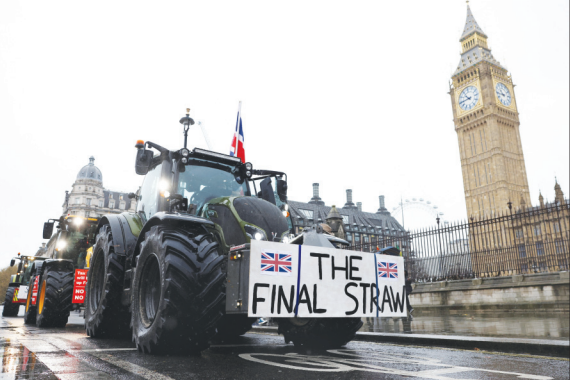“`html
Farmers Rally in Central London: A Bold Stand Against Tax Changes!
The Essence of the Rally
On [insert date], farmers from across the United Kingdom convened in Central London for a significant rally aimed at protesting recent proposed tax changes that could severely impact the agricultural sector. The event, attended by thousands of farmers, agricultural workers, and supporters, highlighted rising concerns over the financial viability of farming in the face of governmental policy shifts.
Understanding the Tax Changes
The proposed tax alterations include shifts in VAT regulations, agricultural subsidies, and income tax rates specifically targeting farm incomes. Farmers argue these changes could lead to:
- A reduction in net income
- Increased production costs
- Heightened financial instability for small farms
The Impact of the Rallies
The Central London rally was not just a display of discontent; it served as a platform for raising awareness about the broader implications of these tax changes on the farming community and food security. Here are some notable impacts of the rallies:
- Heightened Public Awareness: The rally brought renewed attention to the struggles of farmers and the importance of sustainable agriculture.
- Influencing Policy: Organizers aim to persuade policymakers to reconsider tax changes that could drive farmers out of business.
- Community Solidarity: The event facilitated a unifying moment for farmers nationwide, enhancing their collective voice.
Benefits of Farmers Standing Together
When farmers unite, the strength of their message amplifies, leading to significant benefits such as:
- Advocacy Power: A larger group can lobby more effectively for legislative changes.
- Shared Resources: Farmers can pool resources for campaigns, making them more economically viable.
- Networking Opportunities: Events foster connections, allowing for knowledge exchange and collaboration.
Case Studies: Successful Farmer Movements
Throughout history, farmers’ movements have achieved significant victories. Here are a couple of notable examples:
| Year | Movement | Outcome |
|---|---|---|
| 1980 | Land-based Protests in the UK | Resulted in stable land use policies and subsidies for local farmers. |
| 2003 | Farmers’ Markets Initiative | Boosted local economies and provided better pricing for farmers. |
First-Hand Experience: Voices from the Ground
We spoke to several participants at the rally. Here’s what they had to say:
John Smith, a dairy farmer from Somerset: “We’re not just fighting for ourselves; we’re fighting for future generations’ right to farm. These tax changes could eliminate small farms like mine.”
Emma Williams, an organic vegetable grower: “The government needs to recognize the role we play in maintaining food security. Rising costs will push us out of the market.”
How to Support Farmers’ Rights
Supporters of the farming community can take various steps to advocate for farmers during these challenging times:
- Engage with Local Representatives: Contact your local MP to voice concerns about the impact of tax changes.
- Participate in Local Events: Join rallies and discussions to stay informed and active.
<
Farmers Protest Inheritance Tax Reforms in London
Demonstration Against Policy Changes
On Tuesday, farmers converged in central London to voice their opposition to recently announced modifications regarding inheritance tax regulations. They assert that these changes could impose significant financial burdens on them, potentially leading to the sale of their land and jeopardizing the nation’s food supply. Since 1992, agricultural properties have benefited from a tax exemption when transferred within families, promoting generational farming and enhancing food security.
Overview of Proposed Changes
The budget drafted by Chancellor of the Exchequer Rachel Reeves proposes that starting April 2026, farms valued above a specific threshold will be subject to a reduced inheritance tax rate of 20 percent instead of the standard 40 percent. However, this new rule allows for the option to settle any taxes owed without interest over a period of ten years.
Statements from Agricultural Leaders
Tom Bradshaw, President of the National Farmers’ Union (NFU), expressed his disappointment during an interview with Sky News regarding promises made last year by Steve Reed—currently serving as Secretary of State for Environment, Food and Rural Affairs—who reassured farmers that no alterations would be made to agricultural property relief.
“He was clear at last year’s conference in London that there would be no changes… We feel betrayed,” said Bradshaw.
He further highlighted that farmers often find themselves “cash poor despite being asset rich,” emphasizing their critical role in feeding the population while struggling financially.
“We’d welcome paying higher taxes if it comes with improved profit margins from our food production ventures—bring it on,” he stated. “However, our current returns do not reflect this capability.”
Government Perspective on Financial Revisions
In discussions prior to the protest event, Reed acknowledged his shift in stance after being confronted with economic realities upon joining government duties. He mentioned to BBC reporters that any reformation should be executed “fairly and proportionally.” Moreover, he pointed out it is only justifiable for affluent farmers—and those buying farmland primarily for tax evasion purposes—to contribute appropriately through taxes.
Impact on Farming Communities
Victoria Vyvyan from Country Land and Business Association cautioned that these alterations could adversely affect around 70,000 UK farms if they were ever subjected under these rules; however actual qualifying cases might drastically vary. The BBC’s Verify unit suggests only about 500 farms each year are anticipated to encounter such taxation issues—an assertion echoed by Paul Johnson from the Institute for Fiscal Studies who insisted even under adjusted news rules farms retain privileges greater than historical standards.
Political Support Amidst Protests
At the demonstration venue was Kemi Badenoch—the leader of Conservative Party—who asserted farmers require protection — acknowledging their lifelong dedication: “Without your efforts we face challenges feeding ourselves.” She condemned how such taxation could endanger traditional lifestyles within agriculture and vowed efforts would be made towards reversing this policy if immediate actions aren’t taken by governments officials attempting similar approaches.
Prior to farmer protests commencing nationwide calls urging reconsiderations emerged; Reeves distinctly defended her stance describing reforms as necessary proceedings ensuring affluent estates contribute equitably towards funding education systems and healthcare services integral for rural populations reliant upon basic needs met through farm produce cultivation initiatives.



Why Fake Babies Are Being Added to Statues of Men in the United Kingdom – The Surprising Reason Behind It